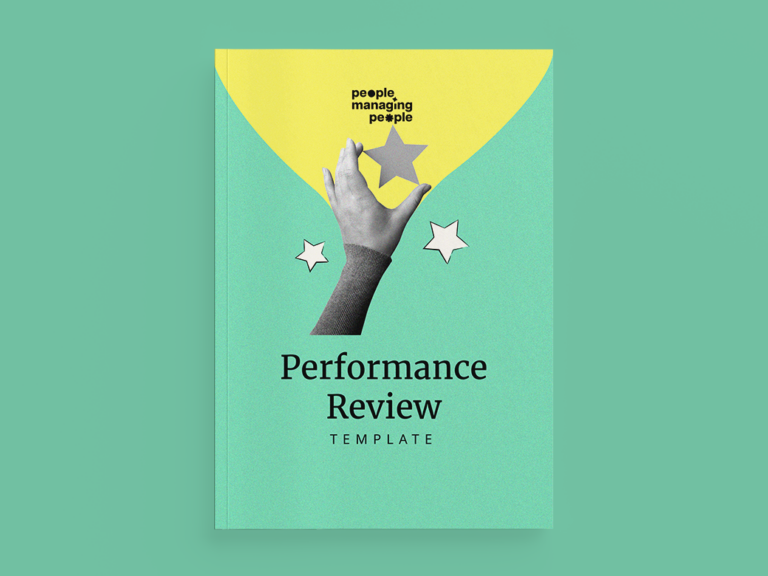Performance reviews are a precious opportunity for managers to connect with their team members and provide feedback and coaching to improve performance and engagement.
There's a lot that goes into them, but asking the right questions in a performance review will open up the conversation, help you to get to the bottom of any issues, and inspire creative solutions.
Use this guide to help you develop effective performance review questions that build trust and help unlock the potential in your teams.
What Makes A Good Performance Review Question?
First up, nothing in a performance review should be too much of a shock.
If feedback functions well, most issues will be raised during the course of daily work. The manager and the employee should have a good idea of where the reviewee is excelling or falling short of expectations.
This means the review should be time to have a deeper discussion around specific issues—addressed or unaddressed.
There might be some slight differences in perception or new bits of feedback here and there, especially if self-reviews and 360-degree feedback are being used, but by and large this is an opportunity to celebrate wins, reflect on challenges and areas of improvement, and revise/create goals.
Therefore, a good performance review question should help guide this conversation by being open-ended, specific, and designed to encourage self-reflection and constructive dialogue.
It should prompt the reviewee to consider their achievements, challenges, and development areas while allowing leaders to gain insights into the employee’s perspective and goals.
Here are key elements that make a performance review question effective:
- Encourages self-reflection: Good questions prompt employees to reflect on their contributions and growth, like "What accomplishments are you most proud of this quarter?"
- Encourages honest dialogue: Questions should make employees feel comfortable sharing both successes and challenges, such as "What challenges did you encounter, and how did you work to overcome them?"
- Focuses on specific outcomes or skills: Questions should address specific areas of performance, skills, or projects, such as "How did you approach meeting your project deadlines?"
- Promotes growth and development: Effective questions look to the future, helping employees think about improvement, such as "What skills would you like to develop over the next six months?"
- Builds on feedback and collaboration: Good questions encourage employees to discuss collaboration, feedback received, or support needed, like "How have you incorporated feedback from colleagues or managers into your work?"
Example of a bad performance review question
“What do you want to do in the future?”
This is vague, what exactly do you want to know? What is the timescale? Instead, make it precise by asking specific things around the future e.g. “What is the next skill you want to learn? How can I help you get there?”
"Do you feel like you’re doing a good job?"
Again, this is a subpar question because it’s vague, doesn’t encourage reflection, and fails to explore areas for improvement, skills development, or future goals.
It also comes across as a bit of a trick question. If a manager has been communicating clearly around expectations, the reviewee should know if they’re performing well or not.
Example of a good performance review question
A better question would be something like:
"What accomplishments are you proud of this period, where do you see opportunities to improve?"
This revised question is open-ended, encourages self-reflection on both strengths and development areas, and opens the door for a productive conversation about performance, progress, and growth.
In general, closed questions are not a good use of time as you want to be opening up a discussion.
You can see how the second question is better for truly opening up a discussion. It gives ownership without passing the buck like a “Do you think you’re doing a good job?” question.
How To Develop Performance Review Questions
While some standard questions are helpful for consistency, customizing questions for each review allows managers to address specific projects, achievements, challenges, or development areas relevant to the individual.
This requires effort of course, but the payoff is conducting performance reviews that actually mean something to the manager and team members.
To develop personalized performance review questions for each team member, follow these steps to ensure the questions are relevant, meaningful, and tailored to individual roles and contributions:
1. Review individual goals and key projects
Start by reviewing each team member's performance metrics, goals, and any major projects they’ve been working on.
Look at what they were tasked to achieve, and consider questions that explore their progress, accomplishments, and challenges.
Example question: “What were your biggest takeaways from working on [specific project], and how do you think it impacted your skills or approach?”
2. Reflect on previous feedback and development areas
Consider any feedback you or others have given previously, either during check-ins or past reviews, to identify areas of growth or recurring challenges.
Craft questions that encourage the reviewee to reflect on their progress and build on previous discussions.
Example question: “Since our last review, what steps have you taken to improve [specific skill or challenge], and what results have you noticed?”
3. Focus on unique strengths and achievements
Identify each team member’s strengths and unique contributions. Ask questions that prompt them to reflect on how they used these strengths and how they might further leverage them for future impact.
Example question: “How have you used your skills in [strength area] to contribute to the team this period, and where do you see further opportunities to apply it?”
4. Consider their career goals and development plans
Think about the employee’s career aspirations and development plans. Craft questions that help them evaluate their progress toward these goals and explore any support they need.
Example question: “How do you feel about your progress toward your career goals, what additional experiences or resources would help you move forward?”
5. Analyze team and role-specific challenges
Reflect on the unique challenges or responsibilities of the employee’s role within the team and ask questions that encourage them to discuss problem-solving approaches, resource needs, or insights gained from navigating these challenges.
Example question: “What challenges did you face specific to your role, and what strategies did you find most effective in addressing them?”
6. Incorporate feedback from others
If you’ve received feedback about the employee from peers, clients, or other team members, consider including questions that encourage self-reflection on these areas. This allows employees to evaluate their teamwork and collaboration.
Example question: “Based on feedback from the team, what’s one area where you feel you could strengthen your collaboration, and what ideas do you have to improve it?”
7. Ask for feedback as well
To truly make it a conversation, make sure that you delve deeper to understand where you can improve in general or in your support of them.
Example question: “Looking at the last review period, where and how has my feedback been helpful and where and how has it been unhelpful?”
8. End with future-focused questions
Develop questions that encourage the employee to think about the future, focusing on new goals, skills to develop, or areas for growth. This can help set the stage for upcoming performance periods.
Example question: “What specific goals would you like to set for the next quarter, and how can I support you in achieving them?”
50 Performance Review Question Examples
As stated, each review will be different and it pays to tailor your questions to the individual.
That being said, here are some examples to help illustrate what I’ve been talking about above and get you started.
Bear in mind that some of these questions are better used as prompts to send to people before a review, and some can be great for delving deeper during a review.
Generally, it’s better to send broader questions beforehand to create a pre-read for both of you. I’ll mark what I consider to be pre-review questions below.
1. Overall performance questions
- "How would you rate your overall performance this period and why?” - This is a great prompt to prep on before the review as a starting point.
- “What factors contributed to your successes or challenges?"
- "What do you think went well, and what, if anything, would you change about your approach?"
- "What are the key results you achieved this period and how do they align with your goals?"
- “What do you think were missed goals or opportunities you could have aimed for in the period?”
2. Employee strengths questions
- “What do you consider your superpower?” Potential pre-review prompt question
- "How have your unique skills or strengths contributed to the team’s success?"
- "Can you share an example of when you used your strengths to overcome a challenge?"
- “How can you flex your strengths/superpowers further?”
3. Areas for improvement questions
- "What specific areas would you like to improve, and what steps do you plan to take?" This again is a potential pre-review prompt.
- "What challenges did you encounter, and how can we support you in addressing them?"
- "Is there a skill or competency you’d like to develop to be more effective in your role?"
- “What, if anything has stopped you up until now to work on improving in these areas?”
- “What do you anticipate will be the main challenges when working on these areas of development?”
4. Project specific questions
- "What specific contributions do you feel had the biggest impact on the project’s success?"
- "What were the biggest challenges you encountered during the project, and how did you overcome them?"
- “Where do you think your goal or project wasn’t ambitious enough and we could have aimed further?”
- "If you were to do this project again, what would you do differently?"
5. Current role questions
- "How do you feel about your current role and responsibilities?"
- "Are there any aspects of your role you find particularly fulfilling or challenging?"
- “What do you enjoy the least about your role?”
- "Is there any support or adjustment needed to help you perform better in your current role?"
6. 360-review feedback questions
- "Are there any skills or qualities highlighted in the feedback that you were unaware of or surprised by?"
- "Based on feedback from others, what are one or two key areas you’d like to improve on, and what steps will you take?"
- "Feedback indicates that you have a strong rapport with clients/stakeholders. What approaches do you use to build and maintain these relationships?"
- “How can you make sure there are more people I can ask for the next set of 360-review questions because you’ve developed stronger cross-functional relationships?”
For more of these, check out PMP's excellent article on 360-review questions.
7. Future outlook questions
- "What are your career goals over the next year, and how can we help you achieve them?" Another good pre-review question.
- "Are there new skills or experiences you’d like to pursue in the future?"
- "Where do you see your role evolving within the team or organization?"
8. Individual needs questions
- "What resources, tools, or support do you need to perform at your best?"
- “Where has the potential lack of tools, resources or support been a genuine serious hurdle in your work over the last [review period]?”
- "Is there anything you feel would help you be more productive or satisfied in your work?"
- "How can I, as your manager, better support your goals and performance?"
9. Continuous growth questions
- "What have you learned recently that has helped you in your role?"
- “What further learning specifically do you think you need to get to the next level in your role?”
- "What professional development opportunities would you like to pursue this year?"
- "What steps can you take to continue growing and developing in your position?"
10. Organizational alignment questions
- What do you understand about how your role and your work over the last [review period] has contributed to the overall organization mission?”
- "How do you feel your work supports our team’s goals and the organization’s mission?"
- "Are there ways we could improve alignment between your goals and the organization’s objectives? What are they?"
- "Do you feel that your role contributes meaningfully to the company's vision? Why or why not?"
11. Quarterly review questions
- "What were your top achievements this quarter, and how did they impact your goals?"
- "What challenges did you face this quarter, and how did you address them?"
- "What new goals or adjustments do you want to focus on for the upcoming quarter?"
12. End-of-year review questions
- "Looking back, what accomplishments are you most proud of from the past year?"
- "What challenges have you overcome, and what did they teach you about your work?"
- "As we move into the new year, what goals or areas of growth would you like to prioritize?"
13. Upward feedback
- “What is your overall experience in working with me?”
- “What has been the most and least useful feedback you’ve received from me? Why?”
- “What do you think I can learn more about being a leader?”
What About After Asking The Question?
You’ve spent time crafting personalized feedback and questions, here are some tips for processing the answers and keeping the conversation open and on track:
1. Listen actively and take notes
Focus fully on what the employee is saying, avoid interrupting, and take brief notes on key points (performance appraisal software can help capture feedback).
This shows respect for their input and allows you to recall specifics when crafting follow-up questions. Listen also with the intent to understand first and only then to respond.
2. Pause to reflect before responding
Take a moment after the employee finishes speaking to process their response fully.
Pausing helps you absorb their words, avoid reacting impulsively, and formulate a thoughtful follow-up question based on what they’ve shared.
Do not be afraid of having some silent moments, silence can actually help draw out better responses.
3. Acknowledge and validate their response
Start follow-ups by acknowledging their input (e.g., "I appreciate you sharing that challenge" or "It sounds like you put a lot of thought into this project").
Validation builds trust and encourages further openness. This doesn’t mean that you’ve “taken their side”, more that you see what they’re coming from.
4. Look for key themes and patterns
As you listen, identify recurring themes, strengths, or challenges mentioned by the employee.
Ask follow-ups that delve into these patterns (e.g., "You mentioned time management as a recurring challenge—can you tell me more about what makes it difficult?").
5. Ask open-ended follow-ups for depth
Use open-ended questions that encourage elaboration, for example “Can you give me an example of how this affected your work?” or “What do you think contributed most to your success in that area?”
Open-ended questions help employees expand on their answers and provide richer insights.
6. Focus on goals and growth in follow-ups
Whenever possible, steer follow-ups toward constructive goal-setting or personal growth. For instance, after discussing a challenge, you might ask, “What would help you overcome this next time?” or “Is there a resource you think could support your progress here?”
7. Use clarifying questions to avoid assumptions
If something is unclear, ask clarifying questions to ensure you fully understand the employee's perspective (e.g., "Can you elaborate on what made this project challenging?" or "What do you mean by ‘more efficient processes’ in this context?").
8. Encourage reflection with ‘what’ and ‘how’ questions
Follow up with questions starting with "What" or "How," as these tend to encourage self-reflection and solution-focused responses. For example, “What did you learn from that experience?” or “How would you approach it differently next time?”.
Depending on seniority and the problem be also prepared for people to not have a perfect answer to this and instead lead them into a discussion.
9. Keep the conversation solution-oriented
Even when discussing challenges, try to guide follow-ups toward constructive steps or improvements.
For instance, if an employee struggled with a task, a good follow-up might be, “What support would make this easier in the future?”
Toward Continuous Performance Management
Performance reviews are made much easier as part of a continuous performance management process.
Rather than one big, cumbersome annual review, the onus is on creating a system of continuous performance monitoring using performance management techniques like quarterly or biannual reviews, regular check-ins, real-time data using performance management tools, and a continuous feedback culture.
Advantages are:
- Reduced pressure on the big annual review
- Keeps goals and progress visible and makes it easier to recognize issues and wins
- Encourages regular self-reflection
- Builds a record of achievements and feedback
- Facilitates ongoing development and goal adjustments
- Promotes a feedback-rich culture.
Sounds good, right? You can take a deeper dive in Eric Grant’s excellent article on continuous performance management.
Performance Review Template

Get our Performance Review template!
Wrapping Up
When it comes to performance reviews, I often think back to HR leader Joey Price’s advice “My #1 piece of advice is for managers to remember that the goal of a performance review is to accurately evaluate and improve or reward performance.”
To that I would add that it is also important to inspire your employees to either continue their performance or to develop further.
And, to truly understand what is inspirational to each person, you have to dig deep, which is where your questions come in as well as these powerful performance review phrases.
Often we get bogged down by the process, calibration, systems and deadlines of a performance review but do not lose the point that in the end it is about a conversation, not a box to tick!
Follow these performance reviews best practices to elevate your reviews into motivational conversations focused on growth and development.




